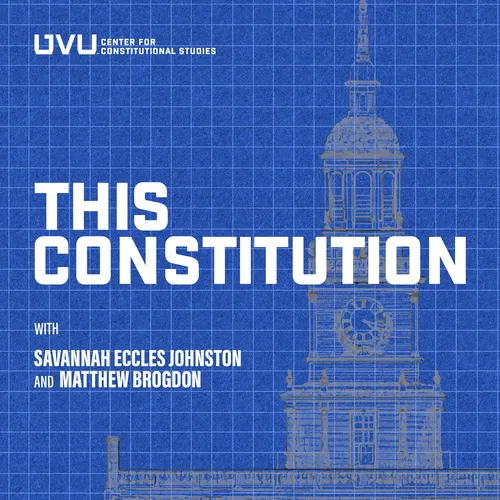Season 2, Episode 18 | America’s Greatest Invention: Collective Constitution-Making
- Author
- Savannah Eccles Johnston & Matthew Brogdon
- Published
- Wed 17 Sep 2025
- Episode Link
- None
What if America’s greatest strength wasn’t just its leaders, but the way everyday people came together to shape history? In this episode of This Constitution, host Matthew Brogdon sits down with Nicholas Cole of Oxford’s Pembroke College, creator of the Quill Project, to dig into the overlooked story of America’s founding.
Far from being the work of a single “lawgiver” like Solon or Jefferson, the Declaration of Independence and other revolutionary texts were born out of spirited collaboration. From town halls in Massachusetts to Virginia’s Fairfax Resolves, communities debated, revised, and ultimately claimed ownership over the words that would launch a nation. Cole explains how this culture of deliberation, grand juries, militias, assemblies, and conventions set America apart from revolutions elsewhere, transforming ordinary gatherings into the foundation of popular sovereignty.
Together, Brogdon and Cole trace how these practices not only produced the Declaration but also laid the groundwork for the U.S. Constitution and federal union. They explore how Jefferson’s draft drew on community voices, and how America’s deliberative spirit still shapes our civic life today.
If you’ve ever wondered what truly makes America’s founding unique, this conversation offers a fresh lens and a reminder of the power of collective decision-making.
In This Episode
- (00:11) Introduction and guest welcome
- (00:31) Origins of American deliberation
- (02:14) Jefferson and collective authorship
- (05:04) Spirit of the American Revolution
- (05:51) Colonial and local deliberative traditions
- (09:29) Fairfax Resolves and local assemblies
- (13:01) Community sense and delay of independence
- (14:33) Popular sovereignty and ratification
- (15:43) Variety of deliberative bodies
- (16:39) Parliamentary law and deliberative procedure
- (19:26) Grand juries and public service
- (22:02) Distinguishing public bodies from mobs
- (24:54) Non-importation agreements and authority
- (26:19) Compulsory support and revolutionary action
- (28:04) American Revolution’s distinctiveness
- (30:06) British and American deliberative traditions
- (33:22) Comparisons to English and European precedents
- (34:20) Ancient and English precedents
- (35:42) Crystallization of deliberative traditions
- (37:07) Federal system and popular constitution-making
- (38:26) The Quill Project overview
- (39:38) Quill Project’s Declaration of Independence work
- (41:12) Resource collections and acknowledgments
Notable Quotes
- (01:00) "Before the American Revolution, most constitutions were the product either of accident and force or the wisdom of a lawgiver. America's different. These things are written by groups of people who deliberate and worry about every word." — Nicholas Cole
- (03:01) "All of those things that Jefferson takes credit for are things that he did in concert with other people. He wasn't starting with a completely blank page." — Nicholas Cole
- (04:44) "The idea that human beings do their best work when they act together, that feature of American thought in the 18th century, was one of the things that really captured my interest." — Nicholas Cole
- (16:54) "There was an idea that there was a proper way for groups of people to behave when they were deliberating together. This often went under the name of something like parliamentary law." — Nicholas Cole
- (28:34) "Most revolutions do not look like the American Revolution in this sense. Other alternatives are definitely available." — Nicholas Cole
- (38:58) "The Quill Project is an attempt to help people understand these sometimes very extended and complicated processes of deliberation. You can think of it as kind of track changes for historians." — Nicholas Cole
